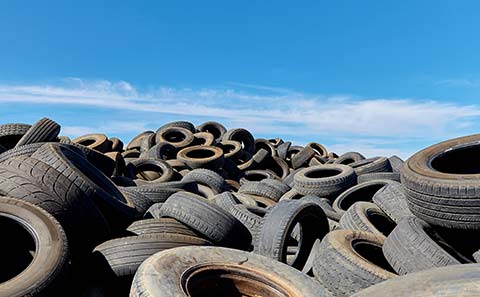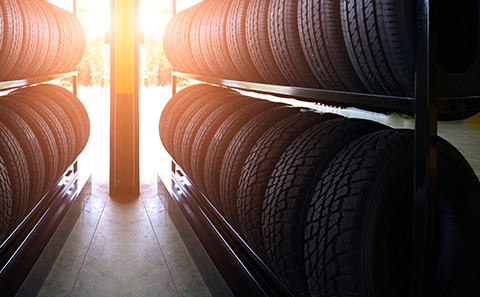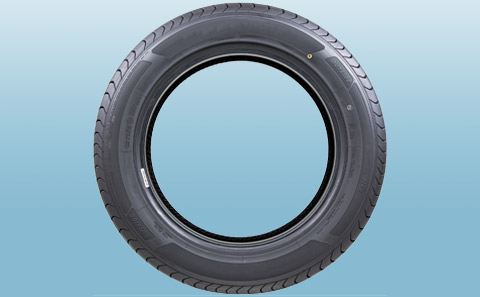Finding quiet tires can be challenging. Different tire technologies offer high driving comfort levels, but many of them don’t deliver on their promise. Well, that might not be the fault of the manufacturer.
Road noise levels are not just regulated by the tires themselves. Often the vehicle type also plays a huge role in the process. But, what can vehicle owners do to decrease road noise levels?
How to Find Quiet Tires for Your Car?
First, it is important to answer what makes a tire quiet. Dealing with road noise can be tedious if you do not purchase the correct tires. It all depends on tire tread and versatile compound materials.
Often tire compounds are not advertised when it comes to tires. Yet, smooth tires are manufactured from softer compounds. Softer tread compounds help reduce noise from tires when driving. However, when you truly want to find the most comfortable tires, look at their tread pattern.

Reducing road noise is made easier with versatile tread elements. A smooth tire will feature the tread design necessary to lower tire road noise. Keep on reading to find out which tread patterns create quiet tires.
Passenger car owners also can reduce tire noise by mounting narrower tire sizes on the vehicle. Wider footprints have larger road contact patches, therefore, they create more noise.
However, another way how to reduce road noise from tires is to get tires placed higher on the tire noise rating chart. The tire noise ratings created by the European Union measure road noise levels in decibels. If you are able to locate tires with this label, the fewer back waves are on this label, the quieter the tire is.
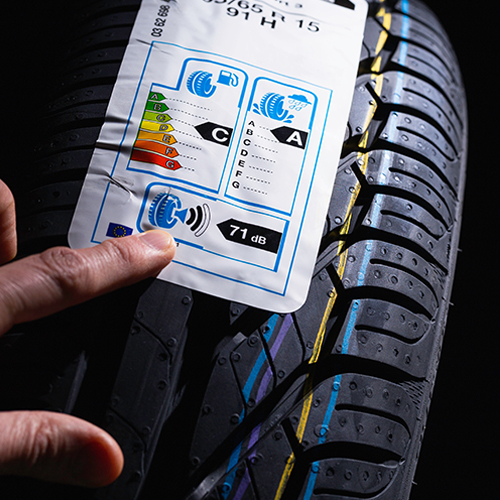
Extreme Performance Tires are Not Quiet, Steer Clear of Them
We can use different types of tires for trucks and passenger cars. To ensure a quiet ride, it is crucial the correct tire performance is chosen from among the different types of tire models.
Sitting in a sports car you might ask yourself: Why are my tires so loud?

The answer may simply be that they are high- or extreme-performance tires. We assure you that the most comfortable tire on this planet is NOT a performance model.
Sadly, high-performance models create excessive tire noise throughout the drive. This is not due to the tire tread blocks or compound materials. The culprit is the speeds these tires reach, which ruins the quiet ride as the noise rating on tires will be high.
What Tires Do Emphasize Quietness and Comfort?
Smooth ride tires belong to specific tire performance categories. Silent tires feature specific tread patterns and compound materials, which work together to reduce noise throughout their lifetime.
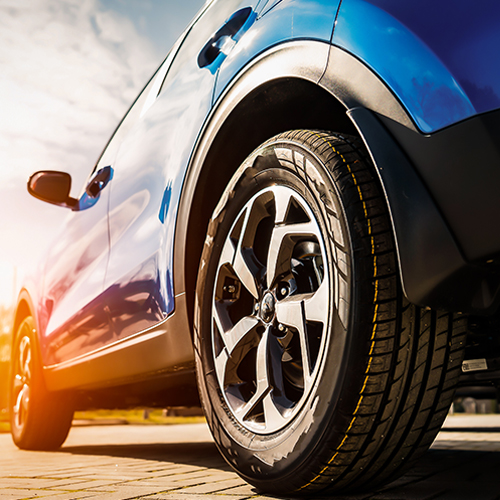
It is safe to say that the best tire for comfort and noise is a touring tire!
Tires belonging to the touring category are designed with one thing in mind: driving comfort! From road noise to vibrations, tire brands make sure touring models guarantee the passengers’ driving enjoyment at all times. Loud tire noise at highway speeds is a thing of the past with them!
Look For These Features if You Want a Quiet Tire
As mentioned before, a quiet ride is mostly regulated by the tire’s tread pattern. There are specific tread elements that generate minimal sound waves, automatically offering lower noise levels.
These tread elements are:
- A ribbed pattern with straight grooves
- Variable pitch pattern created with blocks
- Smaller tread block placement
- Stable tread blocks on the shoulder area
- In-groove sipes to weaken the airflow
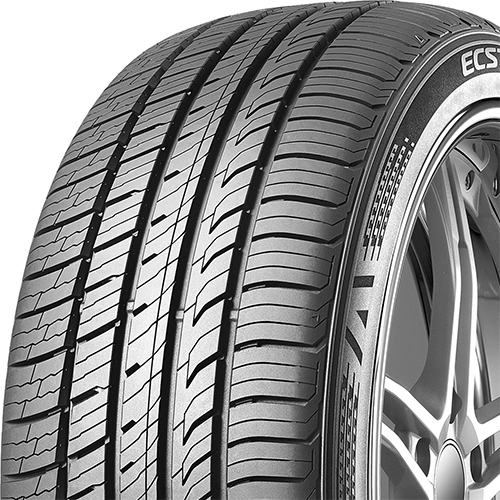
What Causes Tire Noise?
Regular tire noise can be caused by many different factors, including the tire type, tread pattern, compound, road conditions, etc. However, when you hear the ‘womp womp’ tire noise, that’s when you should raise an eyebrow – that sound is not normal or regular.
There are versatile issues that might be behind that noise. From incorrect air pressure levels to vehicle issues, anything can cause it. For this reason, when you hear it, it is important to inspect your tires.
Be sure to check its tire pressure levels and inspect it for bulges. Tire steel belts separating will cause vibrations as well as noise. One thing is for sure, not fixing the problem for longer periods can lead to a shortened tread life.
Other Factors that Contribute to a Quiet Ride
Another factor to consider when dealing with noise levels is the type of vehicle you own. Sadly, with some vehicles, there is no possibility of completely eliminating road noise no matter how hard we try.
This is because specific vehicles need special tires and those tires feature rough tread patterns to provide the necessary traction. In other words, even the quietest all-terrain tires will be louder than touring, passenger car tires.
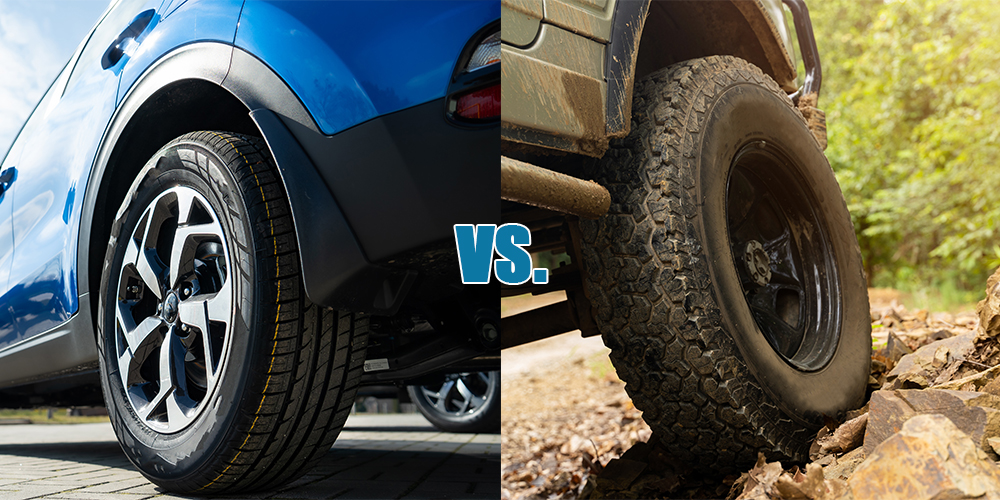
Off-road tires will always generate more noise. There is no way around that. While some tire brands manufacture rugged terrain tires, which offer better on-road comfort levels, they still won’t be able to compete with tires created for comfort alone.
Do Tires Get Louder as They Wear?
It depends on different type of tires, but yes, tires get louder as they wear. The tread pattern plays a big role in improving driving comfort levels. In other words, the high tread levels on tires lower road noise.
There is a wide range of tire types that are manufactured to ensure a quiet driving experience. The tire tread designs, with different comfort technologies, offer tire noise reduction. On the other hand, there are a few things that increase tire noise.
The first thing is uneven tread wear. It minimizes the effort of quiet tread technologies and increases tire noise levels. Secondly, overdue tire rotation will also greatly increase tire noise, as tire treads/types wear out quicker without regular tire maintenance. So, as tires wear out, there’s less rubber on the tread, which significantly increases noise while the tires are in motion.
Don’t forget: there are some high performance tire types that have asymmetric tread patterns that should only be mounted on the right or left side of the vehicle. If you switch them, it will create a loud noise.
How to Quiet Noisy Tires?
“How to reduce tire noise?” is a common question among drivers.
There are a few things you can do to lower road noise. These noise-reducing tires should be properly inflated at the suggested air pressure levels. But, the different tire tread types and other comfort technologies can ensure a quiet performance.
All types of tires can offer a quiet performance by ensuring evenly worn tread formations. This can be ensured by regular tire rotations, alignments, and rebalancing.
However, there are a few tricks that can help you have road noise-reduction tires. First of all, try to find a quiet tire model on the market if your priority is a comfortable drive. Service your tires regularly, which would minimize damage to the tire patterns that can increase noise.
Additionally, you can soundproof the vehicle’s doors and floors. This can be achieved with straps, pads, and some paint that block road noise from reaching the vehicle’s cabin.
Tire Type Chart from Quietest to Noisiest
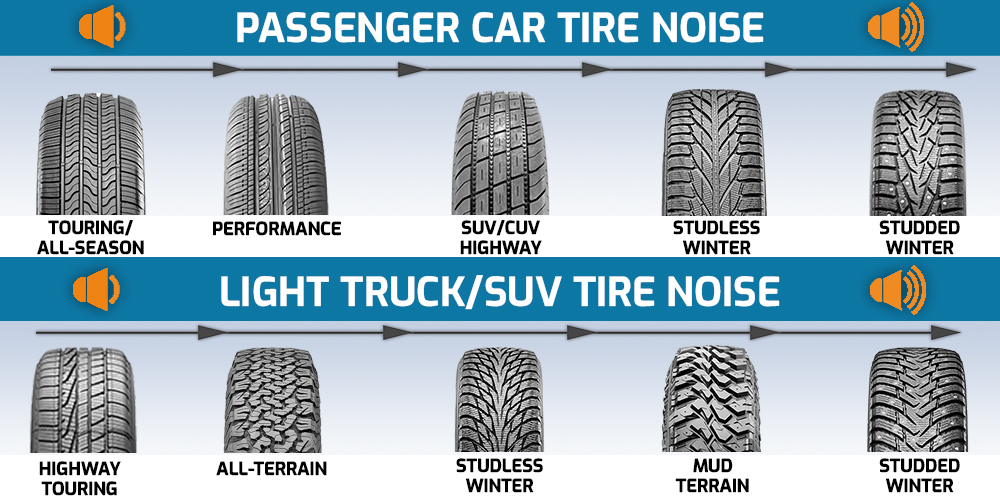
Quiet Tires: Noise-Reduction Technologies
Tire brands have also come up with versatile technologies they can use to ensure high comfort levels.
The oldest technology is the computer optimization of the tread pattern. This noise treatment helps to decrease road noise by preventing sound wave formations. Another possibility is the variable pitch pattern, which negates sound waves after they are created.
Some brands even place a sound-absorbing foam on the tires’ inner lining. This foam filters sound waves through it, weakening their intensity before they reach the vehicle’s cabin.

Frequently Asked Questions
How to Reduce Road Noise in Car?
There are different steps vehicle owners can take to minimize road noise levels. From inspecting the exhaust system and the tires to mounting comfort-oriented tires on their vehicles, there are versatile methods available. Installing sound-blocking barriers is another solution.
Which Tires Are Quietest?
Touring tires are the quietest! These models are manufactured with an optimized groove pattern that helps to significantly decrease road noise reaching the vehicle’s cabin. In other words, they were designed to ensure excellent comfort levels. When it comes to tire width comparison, narrow tires are quieter.
Do Old Tires Make More Noise?
It depends on the tire tread design and state. The minimized new tire road noise is thanks to the optimized tread. Old tires usually have uneven tread wear, which creates a louder noise. But, even if the tire is properly used and is evenly worn, there would still be a tire noise heard during the ride.
